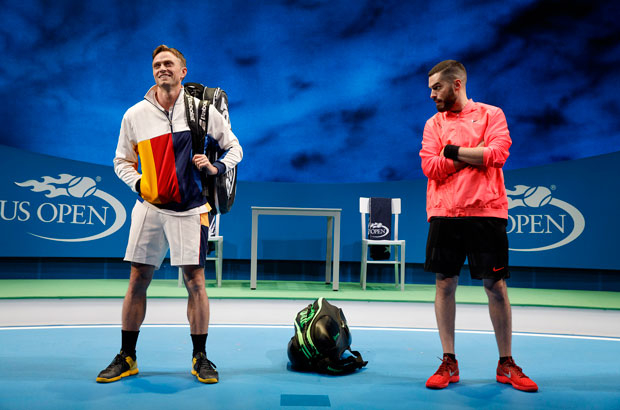The Last Match
Two tennis stars take on each other and their pasts at the U.S. Open in Anna Ziegler’s new play.

(© Joan Marcus)
"It's not exactly a whizzing sound," says tennis pro Tim as he describes the experience of an ace blazing past him. "I'd say it's fast and it's slow all at once." That second phrase aptly describes Anna Ziegler's play The Last Match, now running at Roundabout Theatre Company's Laura Pels Theatre. Gaye Taylor Upchurch's nimble direction keeps this 95-minute play moving at a clip, but Ziegler's story, with plot points that feel like easy lobs, never gets our hearts racing.
The play is set at the U.S. Open semifinals, where aging six-time champ Tim Porter (Wilson Bethel) feels his young Russian rival, Sergei Sergeyev (Alex Mickiewicz), nipping at his heels. During the match, both men are distracted by troubling memories and self-doubt. Having experienced relatively little disappointment in his life, Tim is unnerved by the thought that his retirement may be imminent, and he wonders what he will do if he leaves the tennis circuit. Will his wife, former tennis player Mallory (Zoë Winters), be enough for him, especially if they are unable to have a baby? On the other side of the net, Sergei's mind is also wandering. He still carries around the guilt of his parents' deaths as he negotiates his relationship with his strong-willed girlfriend, Galina (Natalia Payne). Will these distractions derail the two players on the court? And in the end, will the cost of losing this match be as high as they think?
Ziegler uses the metaphor of tennis to engage in some philosophizing about coming to terms with the "bad calls" that life sometimes doles out, but the story's most interesting moments unfold as the two off-court couples attempt to make sense of their relationships. Bethel and Winters have terrific chemistry as Tim and Mallory, a husband and wife trying hard yet failing to bring a baby to term, with Winters delivering a gut-wrenchingly poignant performance. Mickiewicz and Payne, for their part, have a charming, often hilarious dynamic as they volley Sergei's ego back and forth between them. Payne (dressed in sunglasses and several chic outfits designed by Montana Blanco) brightens the stage with a no-nonsense attitude served up like an ice-cold shot of vodka.
Tim Mackabee's tennis stadium-inspired set — augmented by the large floodlights of Bradley King's lighting design and by the pock-pock of tennis balls in Bray Poor's spot-on sound design — gives us the idea of being courtside without replicating an actual court. Two large scoreboards on either side of the stage keep us apprised of who's winning while also acting as backdrops for Mallory and Galina as they watch the match from the sidelines. It's unfortunate that the two women are so often portrayed as spectators, while the men alone have the drive to make it to the top of their games. Mallory is a talented tennis player who just doesn't have the killer instinct necessary to be a pro, and Galina is an intelligent woman who pours most of her energy into looking fabulous and inspiring her boyfriend. Their relative lack of interest in their own professional destinies makes The Last Match less memorable than it might have been.
That's not to say that The Last Match isn't worthwhile or satisfying theater — only that it sticks with gentle serves rather than trying for that ace.








